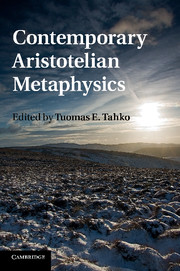Book contents
- Frontmatter
- Contents
- Contributors
- Preface
- Introduction
- Chapter 1 What is metaphysics?
- Chapter 2 In defence of Aristotelian metaphysics
- Chapter 3 Existence and quantification reconsidered
- Chapter 4 Identity, quantification, and number
- Chapter 5 Ontological categories
- Chapter 6 Are any kinds ontologically fundamental?
- Chapter 7 Are four categories two too many?
- Chapter 8 Four categories – and more
- Chapter 9 Neo-Aristotelianism and substance
- Chapter 10 Developmental potential
- Chapter 11 The origin of life and the definition of life
- Chapter 12 Essence, necessity, and explanation
- Chapter 13 No potency without actuality: the case of graph theory
- Chapter 14 A neo-Aristotelian substance ontology: neither relational nor constituent
- References
- Index
Chapter 7 - Are four categories two too many?
Published online by Cambridge University Press: 05 December 2011
- Frontmatter
- Contents
- Contributors
- Preface
- Introduction
- Chapter 1 What is metaphysics?
- Chapter 2 In defence of Aristotelian metaphysics
- Chapter 3 Existence and quantification reconsidered
- Chapter 4 Identity, quantification, and number
- Chapter 5 Ontological categories
- Chapter 6 Are any kinds ontologically fundamental?
- Chapter 7 Are four categories two too many?
- Chapter 8 Four categories – and more
- Chapter 9 Neo-Aristotelianism and substance
- Chapter 10 Developmental potential
- Chapter 11 The origin of life and the definition of life
- Chapter 12 Essence, necessity, and explanation
- Chapter 13 No potency without actuality: the case of graph theory
- Chapter 14 A neo-Aristotelian substance ontology: neither relational nor constituent
- References
- Index
Summary
This chapter was originally written for an event honouring E. J. Lowe. I have not attempted to alter its tone. I consider Lowe a philosopher of the first rank, a philosopher who has resisted the idea that philosophical problems are to be addressed in ways that keep ontology at arm’s length. Nowadays, too much work in metaphysics amounts to little more than the rearrangement of elements in a familiar landscape or the addition of epicycles to going theories. Lowe’s work is a fine example of what the Australians call ontological seriousness. He recognizes that metaphysical issues are not to be addressed by picking and choosing metaphysical nuggets that happen to support favoured theses. When you get on the bus, you must ride it to the end of the line.
I see Lowe as a throwback to my Enlightenment heroes: Locke, Descartes, Priestley, Leibniz, Spinoza, and, in their own ways, Berkeley, Hume, and Kant. The best of these were throwbacks to their medieval scholastic predecessors, to Aquinas, and to Plato and Aristotle. The linguisticization of philosophy, and, in particular, metaphysics, in the twentieth century has blinded us to ways of thinking that were once universal.
- Type
- Chapter
- Information
- Contemporary Aristotelian Metaphysics , pp. 105 - 125Publisher: Cambridge University PressPrint publication year: 2011
- 1
- Cited by

